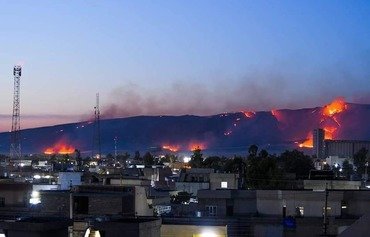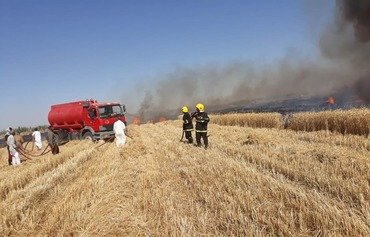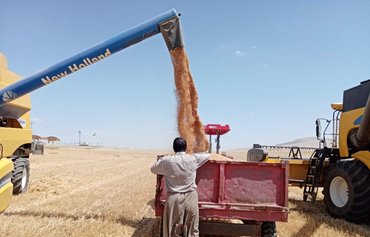Iraqi authorities have taken precautionary measures to ensure that the country's wheat production this year is spared the fires that raged across farmlands in northern provinces last year, an Iraqi official said Monday (April 27th).
The strategic crop's harvest season is slated to kick off mid-May, with expectations of a total production of over six million tonnes of wheat.
Ninawa province officials seek to protect the crops from the fires that ravaged thousands of dunams of wheat fields last season, many of which were blamed on the "Islamic State of Iraq and Syria" (ISIS).
Described as Iraq's breadbasket, Ninawa is the country's epicentre of wheat production, with no less than 6.7 million dunams planted with the crop, accounting for around half of the total wheat farmlands in Iraq.
Securing harvest season
The Ninawa Civil Defence Directorate began implementing Monday its plan to secure the harvest season from fires, said civil defence director Col. Hussam Khalil Abed.
"We have deployed about 45 vehicles of mobile firefighting teams, with supporting vehicles from service departments, with the aim of covering the largest possible area planted with wheat and other agricultural crops in Ninawa," he told Diyaruna.
"Our teams will also provide protection to the storage sites and rapidly intervene in the event of any emergency," he added.
Other precautionary measures include urging farmers to co-operate with security forces by immediately reporting any suspicious movements or activities, Abed said.
The civil defence recently held intensive meetings and seminars with the purpose of educating farmers on the need to follow safety guidelines to protect against fires during harvest, he said.
He said that some of the fires last season were a result of "neglecting to remove dry vegetation, which is highly flammable once exposed to any source of heat".
Additionally, the indiscriminate harvesting of crops and failure to properly divide land plots allowed the fires to spread quickly and on a large scale, said Abed.
The farmers have been highly receptive to the civil defence's latest guidelines, he said.

![An Iraqi farmer harvests wheat and barley fields in Ninawa province in June 2018. [Photo courtesy of the Iraqi Agriculture Ministry]](/cnmi_di/images/2020/04/27/23758-Iraq-Ninawa-farmland-600_384.jpg)







What are the causes of fires in Iraq? And what are the instructions?
Reply1 Comment(s)